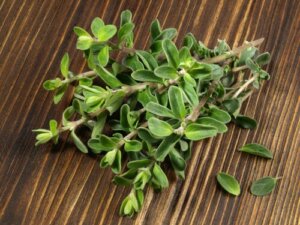The Benefits and Contraindications of Marjoram

Marjoram (Origanum majorana) is an herb known in Mediterranean cuisine for its aromatic nature. The plant belongs to the Lamiaceae family and has also become popular around the world for its medicinal applications. Have you heard about the benefits and contraindications of marjoram?
As detailed in an article published in Evidence-Based Complementary and Alternative Medicine, people grow the herb in countries such as Spain, Hungary, Portugal, Germany, and France. In general, people use it for its anti-inflammatory, antibacterial, gastroprotective, and antioxidant properties.
In this article, we’ll tell you what it’s used for and when you shouldn’t take it
Science-backed benefits of marjoram
When it comes to cooking, you can use marjoram to give a good aroma to soups, salads, and meat dishes. Meanwhile, in traditional medicine people often use it to stimulate digestion and calm the symptoms of menstruation. In fact, people claim it has other benefits as well.
However, there’s no solid evidence to date to consider it as a first-line treatment for any diseases. Thus, it shouldn’t replace medical treatments and it’s not good to use it as the only option against health problems.
If you get sick, it’s first and foremost always best to consult a professional. Now that this is clear, let’s review its main uses.
Discover: Create Your Own Aromatic Garden
It helps to calm digestive problems

In natural medicine, one of the most prominent benefits of marjoram has to do with digestive health. According to research published in The American Journal of Chinese Medicine, this plant has antiulcerogenic properties, possibly due to its content of volatile oils, flavonoids, tannins, and other substances.
Likewise, a study on various herbs published in the Brazilian Journal of Microbiology, found that marjoram is helpful against foodborne illnesses. In particular, it could help fight the pathogen known as Clostridium perfringens.
It helps regulate the menstrual cycle
Marjoram is an ally for women’s health, especially when faced with changes in the menstrual cycle. Both in extract and tea form, it has shown positive effects in restoring hormonal balance.
In fact, the results of a randomized controlled trial published in the Journal of Human Nutrition and Dietetics highlight that marjoram tea is beneficial for patients with polycystic ovary syndrome. It appears to help regulate hormonal activity and insulin sensitivity.
It helps prevent infections
Many of the benefits of marjoram are attributed to its antimicrobial and antifungal properties. Thanks to this, its extracts can help prevent and treat some types of infections. In a study shared in Global Advances in Health and Medicine, marjoram was useful against bacterial overgrowth in the small intestine.
Furthermore, its diluted essential oil has shown interesting effects on fungal skin infections. For now, we need more evidence to verify these uses, but doctors consider it a safe remedy for most healthy adults.
Read also: 5 Home Remedies for Treating Vaginal Yeast Infections
The contraindications of marjoram

We’ve already described the main benefits of marjoram. Now, it’s important to clarify some side effects and possible interactions that the plant may have. If you have any doubts about using it, it’s best to consult your doctor.
- Pregnant or lactating women should avoid marjoram supplements or tea. According to a publication in the International Journal of Obstetrics and Gynaecology, due to its influence on hormonal activity, it can be harmful in these cases.
- Supplements from this plant can interfere with blood clotting. Therefore, doctors advise against it if you are being treated with anticoagulants or have associated disorders.
- The plant and its extracts interact with diabetes medications by reducing blood glucose levels. Therefore, it’s best to avoid taking it in these cases, unless your doctor authorizes it.
How to take advantage of the benefits of marjoram?
If marjoram isn’t contraindicated for you, you can include it in small quantities in various recipes. You can even combine it with a tablespoon of cooking oil to add it to soups, stews, salads, vegetables, recipes with meats, among others.
Now, if you take it as a supplement or tea, we recommend you follow the manufacturer’s instructions for consumption. Whenever possible, it’s better to ask your doctor before taking anything on a regular basis.
All cited sources were thoroughly reviewed by our team to ensure their quality, reliability, currency, and validity. The bibliography of this article was considered reliable and of academic or scientific accuracy.
- Al-Howiriny T, Alsheikh A, Alqasoumi S, Al-Yahya M, ElTahir K, Rafatullah S. Protective Effect of Origanum majorana L. ‘Marjoram’ on various models of gastric mucosal injury in rats. Am J Chin Med. 2009;37(3):531‐545. doi:10.1142/S0192415X0900703X
- Radaelli M, da Silva BP, Weidlich L, et al. Antimicrobial activities of six essential oils commonly used as condiments in Brazil against Clostridium perfringens. Braz J Microbiol. 2016;47(2):424‐430. doi:10.1016/j.bjm.2015.10.001
- Haj-Husein I, Tukan S, Alkazaleh F. The effect of marjoram (Origanum majorana) tea on the hormonal profile of women with polycystic ovary syndrome: a randomised controlled pilot study. J Hum Nutr Diet. 2016;29(1):105‐111. doi:10.1111/jhn.12290
- Chedid V, Dhalla S, Clarke JO, et al. Herbal therapy is equivalent to rifaximin for the treatment of small intestinal bacterial overgrowth. Glob Adv Health Med. 2014;3(3):16‐24. doi:10.7453/gahmj.2014.019
-
Ernst, E. (2002). Herbal medicinal products during pregnancy: are they safe? BJOG: An International Journal of Obstetrics and Gynaecology, 109(3), 227–235. https://doi.org/10.1111/j.1471-0528.2002.t01-1-01009.x
-
Yazdanparast R, Shahriyary L. Comparative effects of Artemisia dracunculus, Satureja hortensis and Origanum majorana on inhibition of blood platelet adhesion, aggregation and secretion. Vascul Pharmacol. 2008;48(1):32‐37. doi:10.1016/j.vph.2007.11.003
-
Yen HF, Hsieh CT, Hsieh TJ, Chang FR, Wang CK. In vitro anti-diabetic effect and chemical component analysis of 29 essential oils products. J Food Drug Anal. 2015;23(1):124‐129. doi:10.1016/j.jfda.2014.02.004
This text is provided for informational purposes only and does not replace consultation with a professional. If in doubt, consult your specialist.








